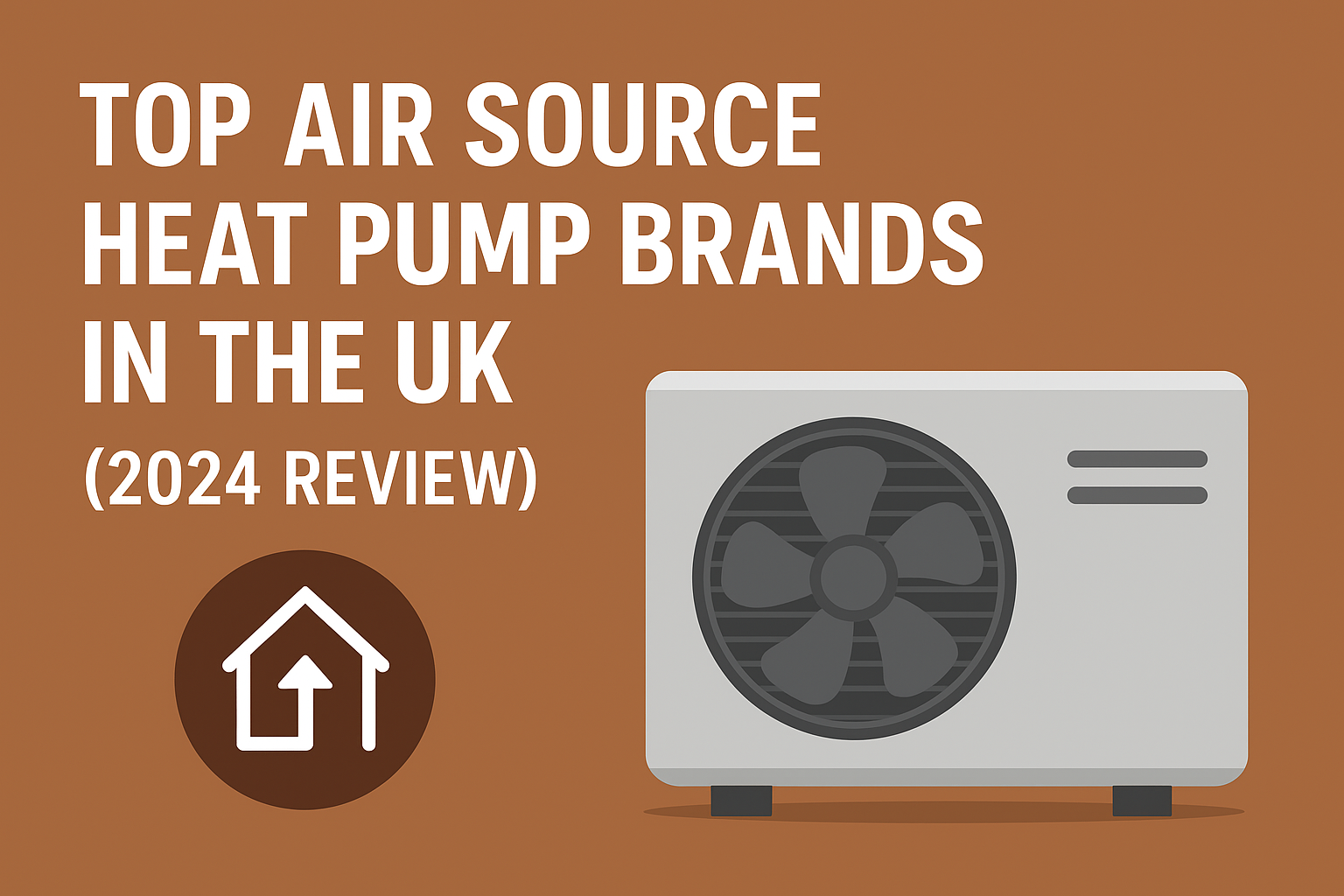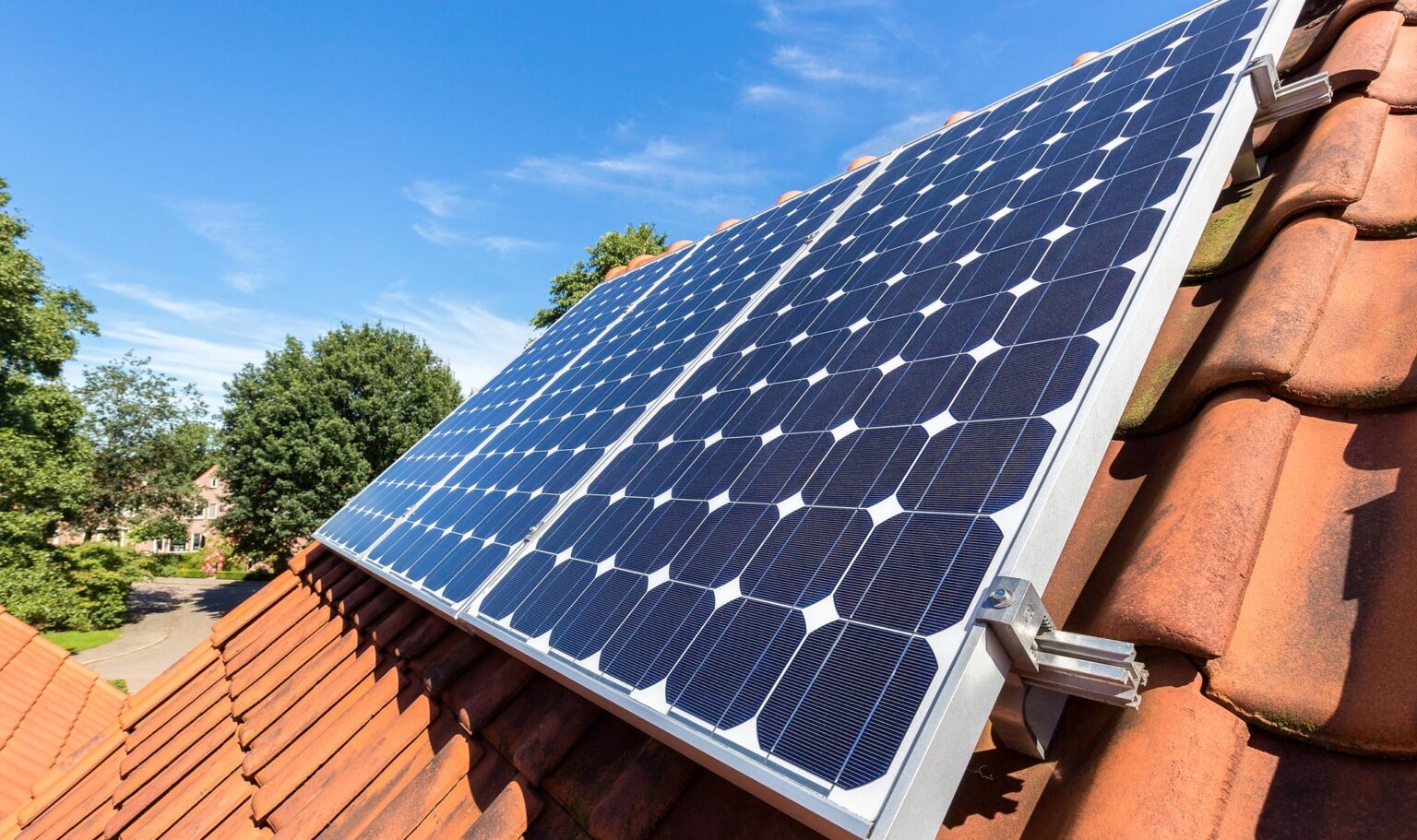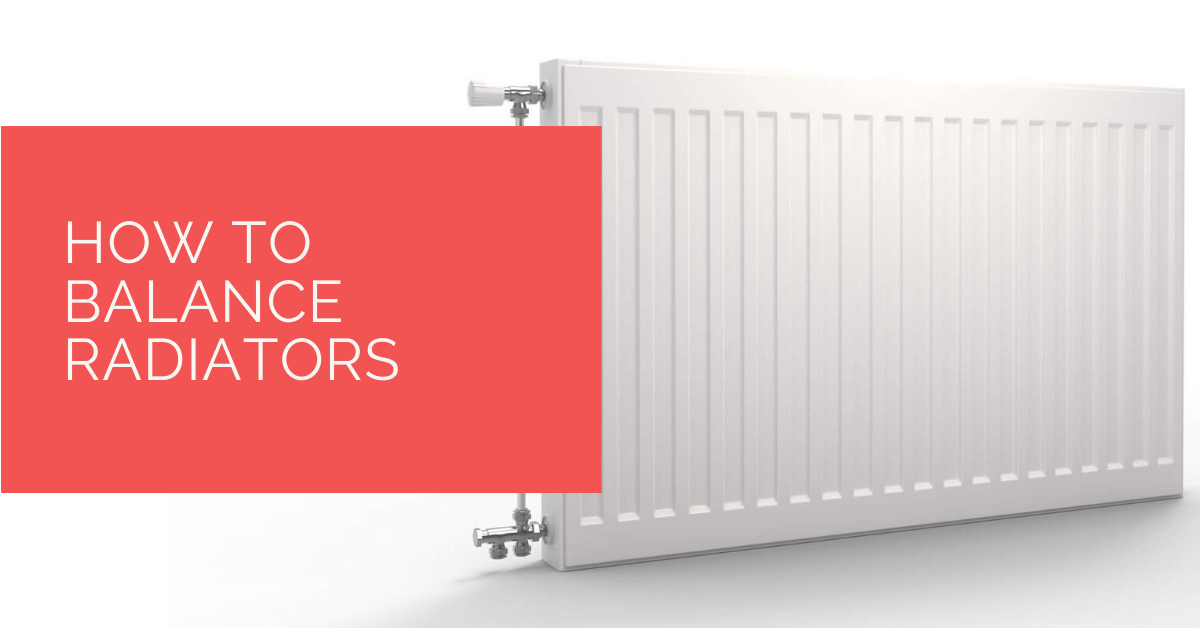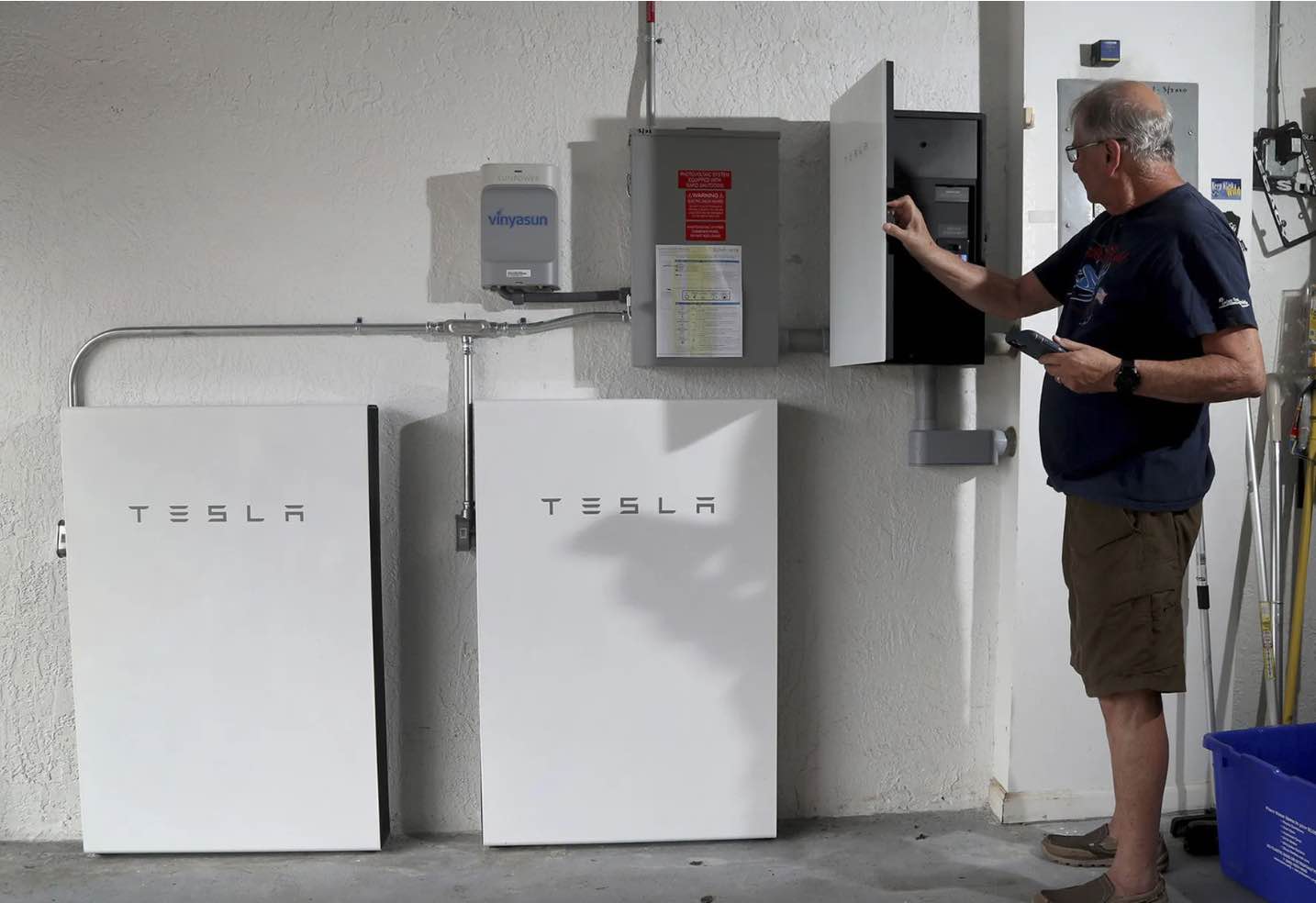What Are the Energy Schemes That Grant Free Solar for Your Home
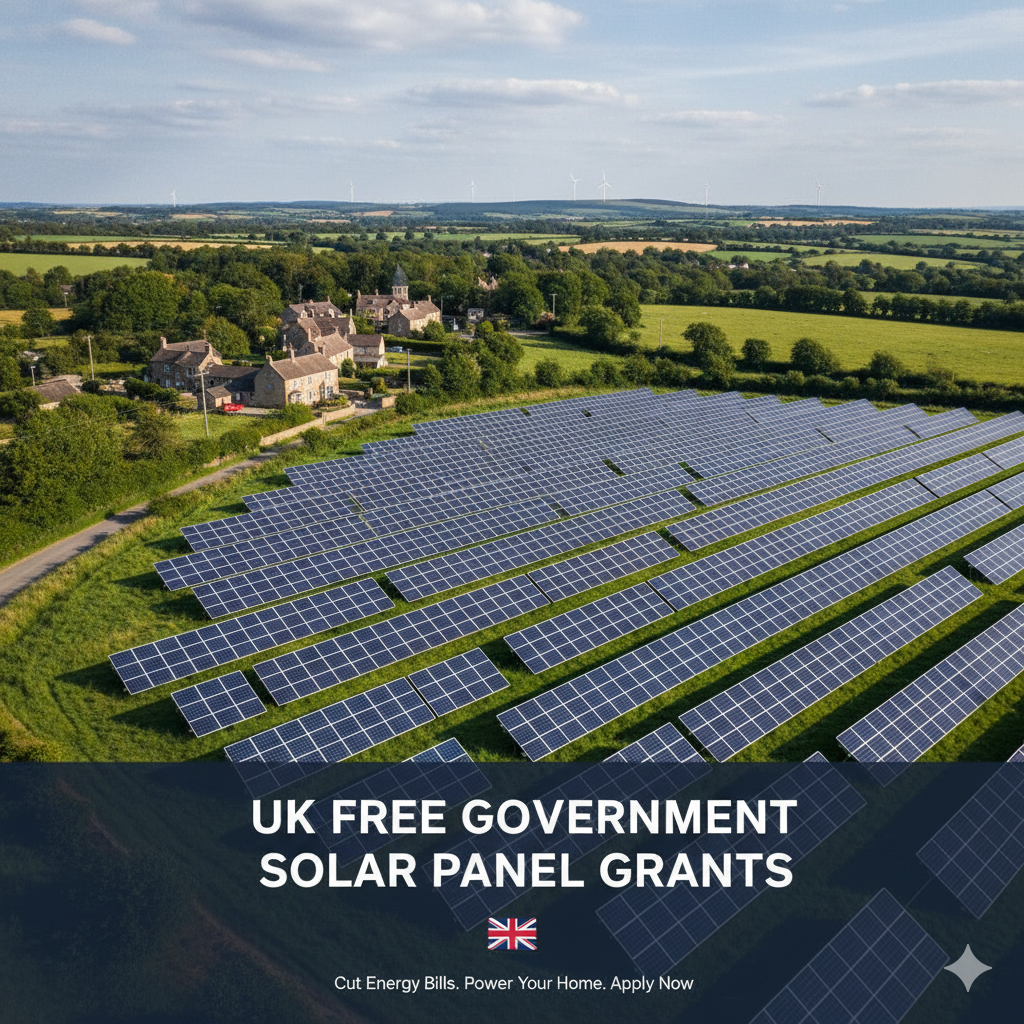
Understanding Your Path to Free Solar Panels
Having worked with dozens of families struggling with rising energy costs, I’ve seen firsthand how confusing the UK funding landscape can be when you’re trying to figure out which solar panel grant actually applies to your situation. The Energy Company Obligation (ECO4) scheme stands as the primary gateway for homeowners and private tenants seeking solar panel funding options, but here’s what most people miss: your property needs an EPC grade of E, F, or G to get started, which means your home must have low Energy Performance Certificate ratings before you start the application.
Key Benefits That Unlock ECO4 Funding:
Below Are the Benefits:
- Universal Credit (UC)
- Income Support (IS)
- Income-based Jobseekers Allowance (JSA)
- Income-related Employment & Support Allowance (ESA)
- Housing Benefit
- Working Tax Credit (WTC)
- Child Tax Credits (CTC)
- Pension Credit Guarantee
- Pension Credit Savings Credit
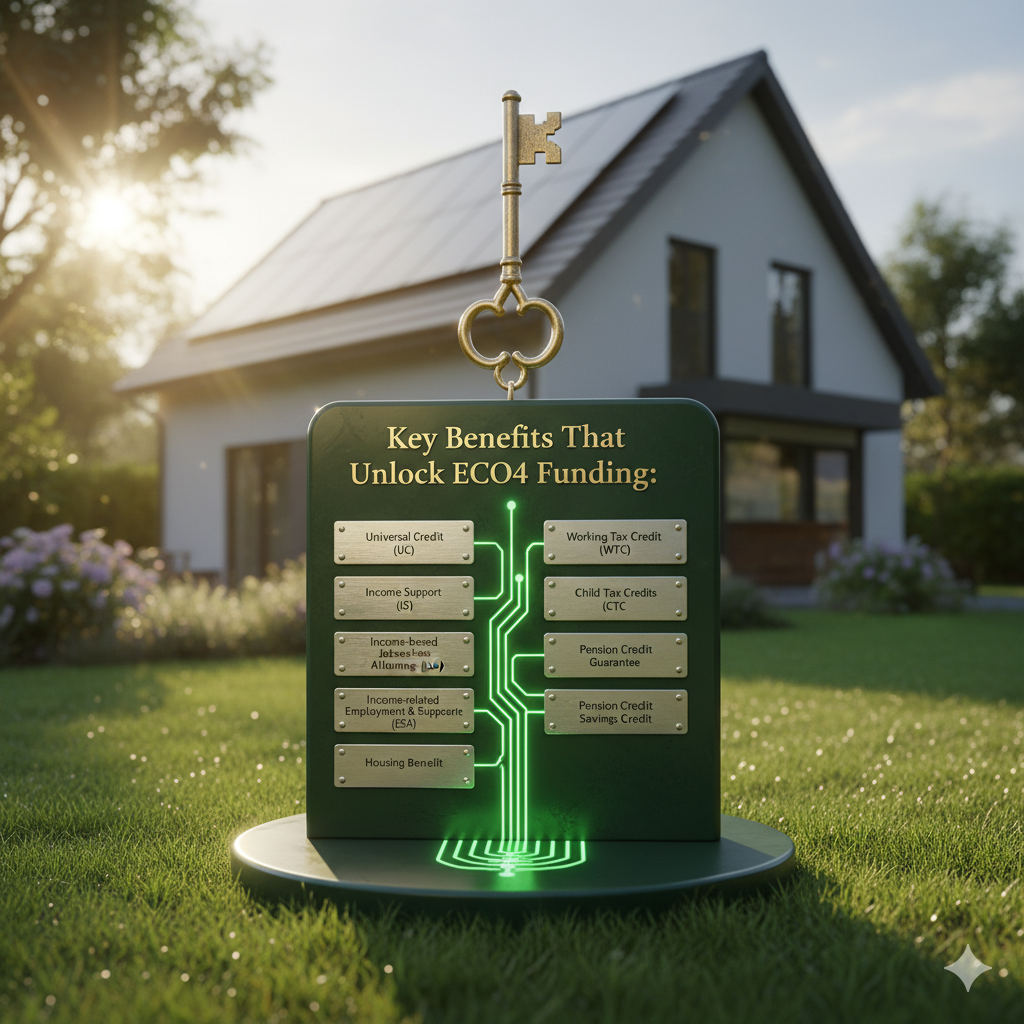
The eligibility criteria extend beyond just your EPC rating—whether you’re receiving any of these benefits directly impacts your access to grants and ECO4 home improvement support. What surprised me most when helping a single-parent household last year was discovering the income threshold varies dramatically based on family size:
Below table will help you:
| Household Type | One Child | Two Children | Three Children | Four or More Children |
| Single-Parent Household | £19,900 | £24,800 | £29,600 | £34,500 |
| Two-Parent Household | £27,500 | £32,300 | £37,200 | £42,000 |
The UK government designed these thresholds recognizing that household income under £31,000 per year often means families face impossible choices between heating and other essentials. Through Local Authority Flexibility (LA Flex), the scheme opens doors for residents who don’t receive tested means-tested benefits but still face fuel poverty or represent vulnerable households at risk of living in a cold home.
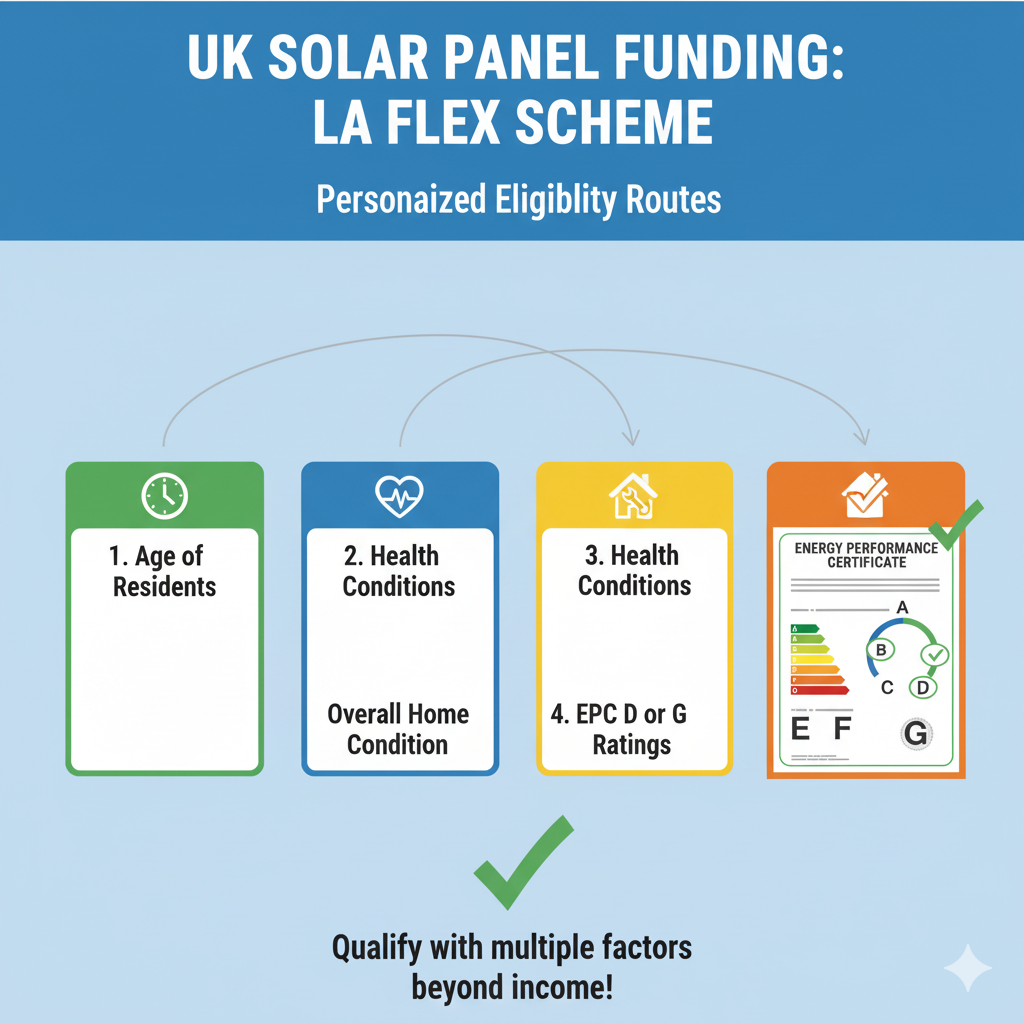
What if you didn’t qualify For Eco4 :
LA Flex Route
Local councils in each region now have the power to asses eligibility routes based on multiple factors beyond standard income-related criteria.
This personalized approach considers:
- Age of residents
- Health conditions affecting number of people in the house
- Overall condition of the home
- Specific requirements related to EPC (D or G ratings in some cases)
This flexibility means even if you’re a private tenant or homeowner who doesn’t fit the standard eligibility criteria, your circumstances might still qualify you for solar panel funding options through LA Flex. The scheme essentially recognizes that low-income homeowners and tenants need personalized pathways rather than one-size-fits-all solutions, and having Child Benefit alone can sometimes open doors you didn’t know existed for ECO4 funding.
Who Can Get Free Solar Panels in the UK in 2025
Your Gateway to Government-Funded Solar Energy
The truth about free solar panels in the UK for 2025 is simpler than most people realize—if you’re among the vulnerable households struggling with rising costs, the government-backed grants and schemes like the Energy Company Obligation 4 (or ECO4 scheme) running from April 2022 through March 2026 represent a genuine £4 billionprogramme designed specifically to help low-income and fuel-poor families install solar panels and boost energy efficiency across the nation.
Here is Quick Eligibility Checklist I’ve personally guided families through this process where funding between £7,000 and £20,000+ covered the full cost of installation, particularly for homeowners whose properties had a low energy efficiency rating.
Quick Eligibility Checklist:
| Eligibility Factor | What You Need | Why It Matters |
| Income | Must meet threshold requirements | Ensures support reaches those who need it most |
| Benefits | Receiving qualifying government support | Fast-tracks your application process |
| Energy Performance Certificate | EPC rating of E, F, or G | Identifies homes needing urgent improvement |
| Property Status | Homeowners or qualifying tenants | Determines who can authorize installation |
What consistently surprises people is how straightforward the rules actually are once you understand that your income, the benefits you receive, and your EPC rating form the three pillars determining whether you qualify. The exciting development is the Warm Homes Plan launching in 2025, which expands opportunities for even more households to access renewable energy solutions and cut energy bills significantly.
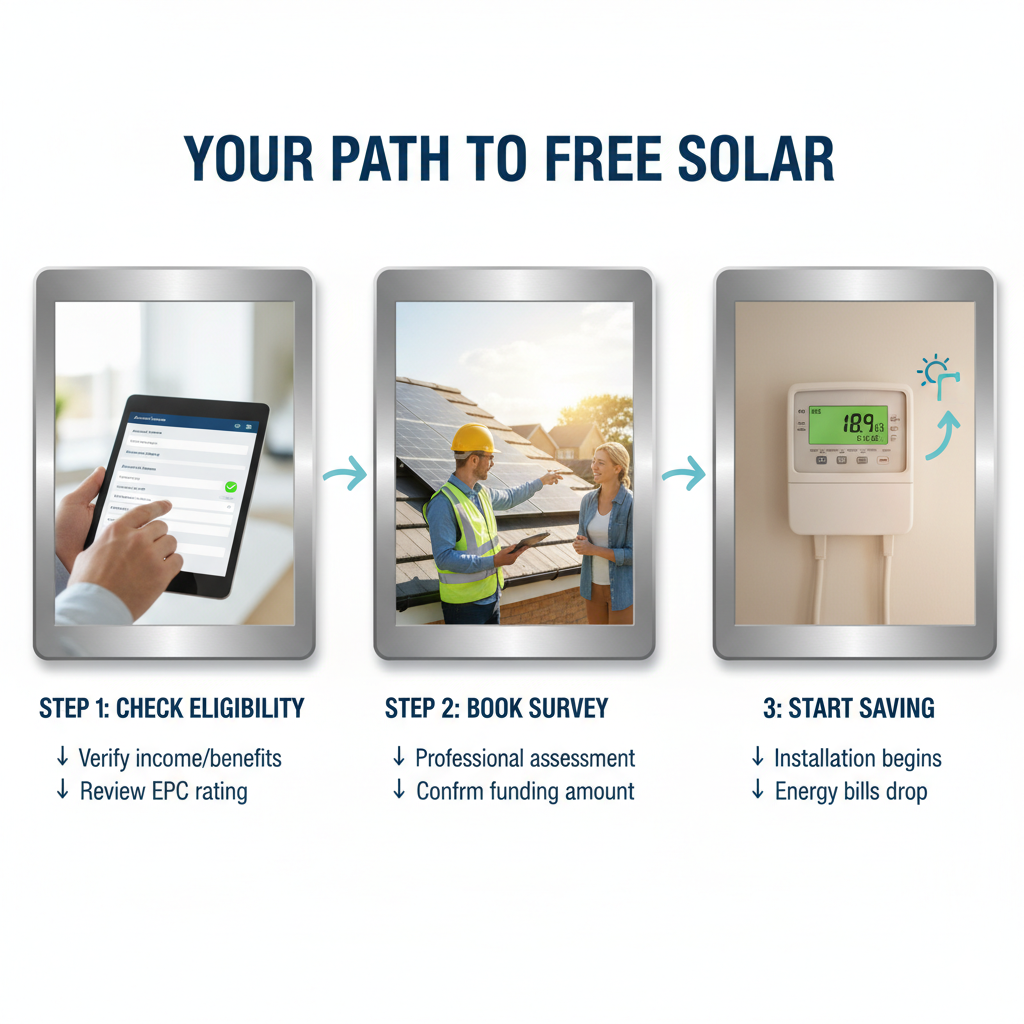
Funding Breakdown:
- 💷 £7,000 – Minimum funding for qualifying households
- 💷 £20,000+ – Maximum support for homes with low energy efficiency rating
- 💰 £4 billion – Total programme budget ensuring widespread access
What strikes me most after years in this field is how many eligible families never book survey appointments simply because they assume the process is complicated, when in reality you could start saving within weeks of your initial application. The scheme prioritizes those who need it most, and if your property meets the criteria, the financial relief can be transformative for your household budget through this government-backed initiative focused on renewable energy.
CHECK YOUR ELIGIBILITY FOR FREE SOLAR PANELS
I’ve walked countless UK homeowners through the process of discovering whether they’re eligible for an ECO4 home upgrade, and the most frustrating part is always the same—people wait months before checking their eligibility when it literally takes two minutes to find out if your home qualifies for solar panel grants in the UK. The simplest starting point is your post code (something as straightforward as EC1A 1BB format), which instantly connects you to your local scheme and reveals which incentive programs apply to your area, because the key criteria for solar panel funding options vary depending on where you live and what support Wintak Homes or similar providers can offer to help you reduce energy bills through these government-backed opportunities.
Home Energy Scotland Grant and Loan Scheme
When I first helped a family in the Highlands navigate the Home Energy Scotland Grant and Loan system, what struck me was how the criteria differ dramatically from England’s approach—homeowners who own property in Scotland can apply for this grant and loan scheme whether they’re upgrading existing homes or even building own home from scratch, though if you’re constructing a new property, the loan specifically covers renewable systems like solar panels but not other energy-efficient improvements. Here’s the catch that trips people up: landlords, businesses, and property developers aren’t eligible for this scheme, which keeps the focus squarely on residential households who actually live in the properties they’re improving.
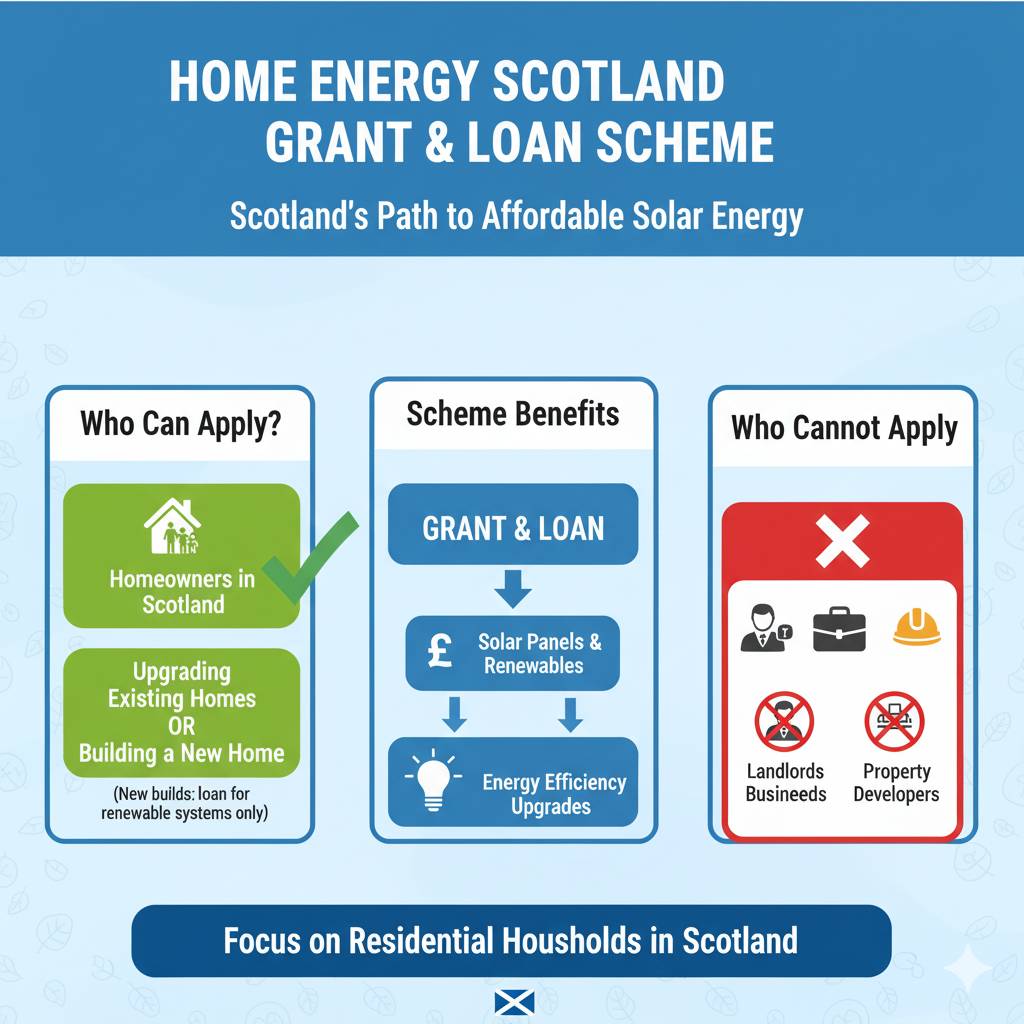
Funding Structure at a Glance:
| Improvement Type | Grant Funding | Maximum Grant Amount | With Rural Uplift |
| Energy Efficiency Improvements | Up to 75% of combined cost | £7,500 | £9,000 |
| Heat Pumps | Dedicated support | £7,500 | £9,000 |
| Solar Panels | Covered under renewable systems | Part of overall grant | Enhanced with rural uplift |
The beauty of this scheme lies in its flexibility—the grant covers a substantial portion of your improvements, and you can choose to take the remaining funding as an optional interest-free loan, meaning a household upgrading solar panels and other systems never faces the crushing burden of upfront costs. What surprised my clients most was discovering the rural uplift provision, which pushes the maximum grant amount from £7,500 to £9,000 for qualifying locations, recognizing that rural properties often face higher installation challenges and deserve extra support for their energy efficiency improvements.
Quick Eligibility Breakdown:
✅ Eligible: Homeowners living in their own property
✅ Eligible: Self-builders (constructing new homes) for renewable systems only
❌ Not Eligible: Landlords, businesses, property developers
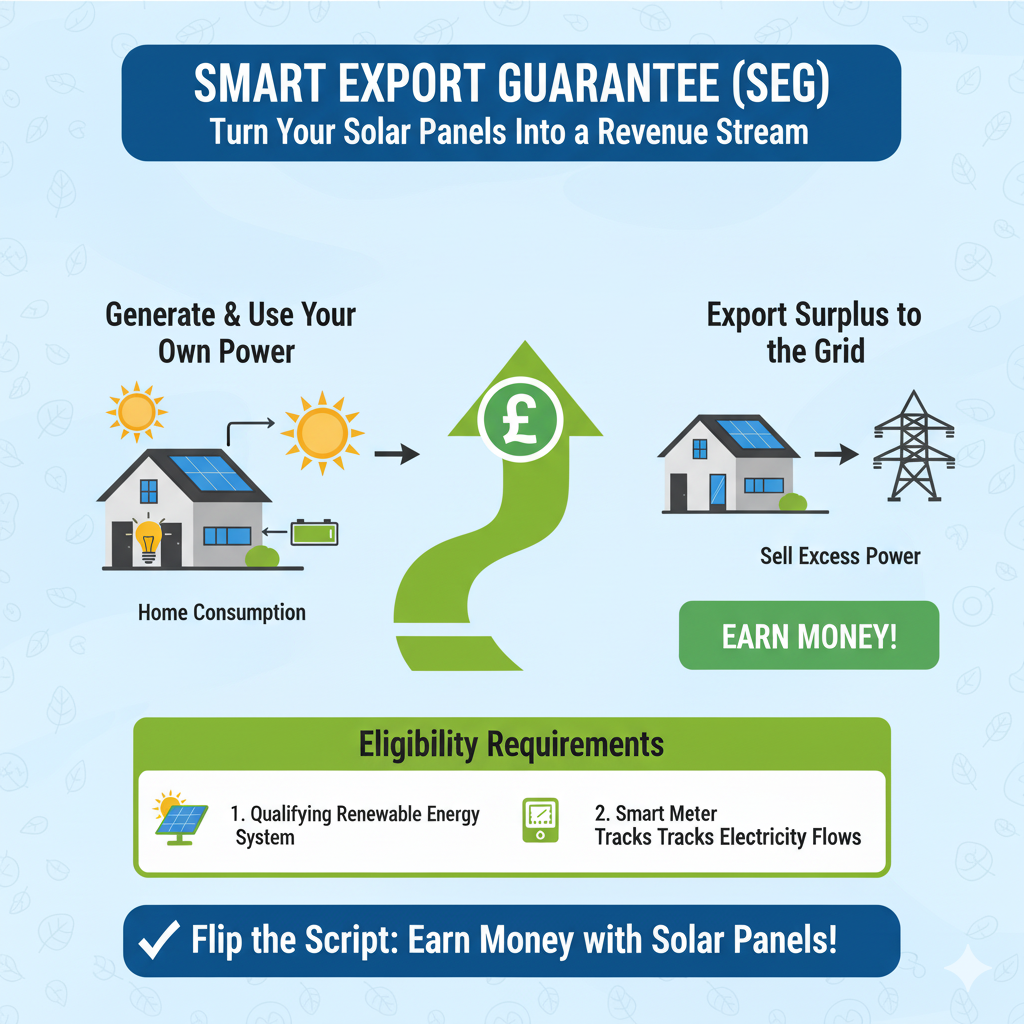
Smart Export Guarantee (SEG)
The Smart Export Guarantee (SEG) completely flips the script on how you think about renewable electricity generating system ownership—instead of just cutting your bills, you actually earn money by exporting your surplus generated electricity back to the grid, and after helping dozens of households set this up, I’ve learned the eligibility requirements are refreshingly straightforward as long as your qualifying renewable energy system meets the SEG criteria and you have a meter capable of tracking electricity flows. The scheme covers multiple technologies including solar photovoltaic (solar PV), wind, micro combined heat and power (micro-CHP), hydro, and anaerobic digestion (AD), though the real power lies in understanding that certain electricity suppliers known as SEG Licensees are mandated by law to offer you payment conditions when you meet their specific eligibility criteria, transforming your home from an energy consumer into a micro power station that feeds clean energy back to the grid through the SEG.
SEG-Eligible Technologies:
| Technology | Common Use | Export Potential |
| Solar Photovoltaic (Solar PV) | Rooftop panels | High during sunny days |
| Wind | Small turbines | Consistent in windy areas |
| Micro Combined Heat and Power (Micro-CHP) | Home heating + electricity | Steady generation |
| Hydro | Stream/river power | Reliable flow-dependent |
| Anaerobic Digestion (AD) | Organic waste conversion | Continuous output |
Quick SEG Setup Requirements:
✅ Qualifying renewable energy system installed
✅ Meter for tracking electricity export
✅ Registration with SEG Licensees (electricity suppliers)
✅ Meet specific eligibility criteria and conditions
Free Solar Panel Grants FAQs
Everything you need to know about free solar panels and ECO4 grants
How do solar panels work in the UK climate?
Solar panels convert sunlight into electricity using photovoltaic cells and don’t need direct sunlight to function. They generate electricity even on cloudy days, which is perfect for the UK’s weather. The UK receives an average of 4 hours of peak sunlight daily, enough for solar panels to be highly effective.
How much do solar panels cost in the UK?
The average cost of a 3.5kWp solar panel system ranges from £4,800 to £6,100. However, with ECO4 grants, eligible households can receive funding between £7,000 and £20,000, potentially covering the full installation cost, especially for homes with low EPC ratings.
How much can I save on energy bills with solar panels?
A typical solar panel system can save households between £170 to £800 per year on electricity bills. Savings depend on system size, electricity usage patterns, energy prices, and your location in the UK.
Do I need planning permission for solar panels?
In most cases, solar panel installation is considered “permitted development” and doesn’t require planning permission. However, exceptions include listed buildings, properties in conservation areas, or installations that protrude more than 200mm from the roof slope.
How long do solar panels last?
Solar panels typically have a lifespan of 25 to 30 years, but with proper care, some models can last up to 40 years or longer. Their efficiency gradually declines at a rate of 0.5% to 0.8% per year, meaning they’ll still operate at 75-87.5% efficiency after 25 years.
What happens if I move house?
You can either take your solar panels with you or leave them for the new owners. Most homeowners leave them as they increase property value and make homes more attractive to buyers. If you take them, you’ll need to arrange removal and reinstallation costs.
What is the typical payback period for solar panels?
The payback period typically ranges from 6 to 10 years, depending on system size, sunlight exposure, and energy consumption. After this period, the electricity you generate is essentially free, leading to significant savings over the 25-30 year lifespan.
How many solar panels do I need for my home?
A typical UK home might require a 4kW system, consisting of about 16 panels covering approximately 29 square metres of roof space. This can generate around 3,400kWh of electricity per year, covering a significant portion of average household electricity needs.
Can I install solar panels myself?
While technically possible, it’s not recommended. Professional installation ensures proper setup, compliance with regulations, warranties, and guarantees. To qualify for ECO4 grants and other incentives, you’ll need a certified MCS installer.
What about solar batteries? Are they worth it?
Solar batteries store excess energy generated during the day for use at night, increasing your energy self-sufficiency. They cost between £1,200 to £6,000 depending on capacity. While they add to initial costs, they can provide greater long-term savings and energy independence.
What government incentives are available for solar panels?
Key incentives include 0% VAT on solar panels until March 2027 (saving up to £2,850), the Smart Export Guarantee (SEG) for selling surplus energy, ECO4 scheme covering up to 100% of costs for eligible households, and the Home Upgrade Grant providing up to £10,000 for qualifying homes.
Who qualifies for the ECO4 solar panel grant?
You may qualify if you’re a homeowner or private tenant with landlord permission, receive qualifying benefits (Universal Credit, Pension Credit, Child Benefit with income threshold), and have a low EPC rating (D-G). The scheme focuses on low-income and vulnerable households.
Can landlords apply for ECO4 scheme?
Yes, landlords can apply if their tenants receive qualifying benefits, are on low income, suffer from health conditions impacted by cold homes, or experience fuel poverty. The scheme helps improve energy efficiency for rental properties.
What is the Smart Export Guarantee (SEG)?
The SEG requires large energy suppliers to pay homeowners for surplus electricity generated by solar panels and exported back to the grid. Payment rates vary between suppliers, providing an additional income stream from your solar investment.
What is the Home Upgrade Grant?
Available from April 2023 to March 2025, the Home Upgrade Grant provides up to £10,000 for home improvements including solar panels. It’s aimed at low-income households off the gas grid with poor energy efficiency ratings.
Does ECO4 participation affect my benefits?
No, participation in the ECO4 scheme does not impact your eligibility for benefits. The scheme is designed to provide free energy-saving measures to those who need it most without affecting your benefit status.
How much funding is available through ECO4?
The ECO4 scheme, running from April 2022 to March 2026, is a £4 billion programme. Eligible households can receive funding between £7,000 and £20,000+ to cover solar panel installation and other energy efficiency improvements.
What is the Warm Homes Plan?
Starting in 2025, the Warm Homes Plan offers additional help for households looking to upgrade to renewable energy and cut energy bills. It’s designed to work alongside ECO4 to provide comprehensive support for energy-efficient home improvements.
Are there regional solar panel schemes available?
Yes, region-specific programmes exist such as the Nest scheme in Wales and Home Energy Scotland loans and grants. These provide additional support for solar panel installations beyond the national ECO4 scheme.
Why choose MCS-certified installers?
MCS (Microgeneration Certification Scheme) certification is the UK’s quality mark for renewable energy installations. MCS-certified installers ensure high-quality installations, valid warranties, and eligibility for government incentives like SEG and ECO4 grants.
Latest Insights & Guides
Top Air Source Heat Pump Brands in the UK (2025 Review)
Introduction With rising energy bills and the UK’s push toward net-zero carbon…
Solar Panel Systems: Your Complete Guide to Grant-Backed Renewable Energy Solutions
Solar panel systems have revolutionized how homeowners approach energy consumption, offering a…
TRV – How Thermostatic Radiator Valves Improve Heating Efficiency in 2025
Introduction Homeowners in the UK are increasingly looking for ways to reduce…
How Do You Balance Radiators? Step-by-Step Guide for Efficient Heating
When your central heating isn’t working as it should—some rooms feel too…
Tesla Powerwall 3 Price for ECO4 – What UK Homeowners Need to Know
Introduction The Tesla Powerwall 3 is one of the most advanced home…
Retrofit Assessments – A Complete Guide for UK Homeowners in 2025
Introduction With rising energy costs and growing concerns about climate change, more…
